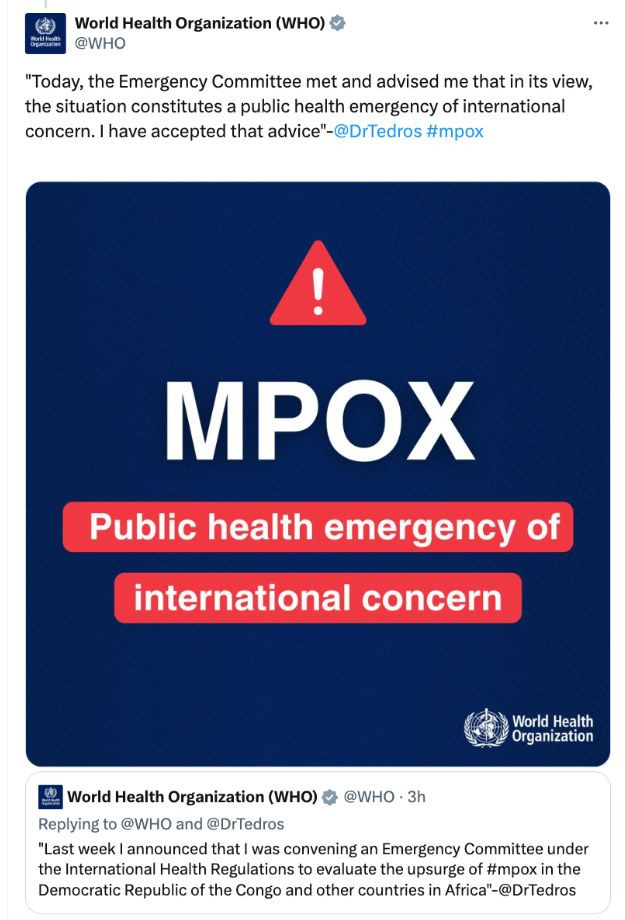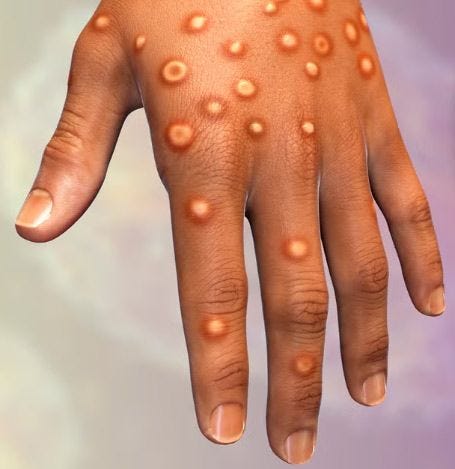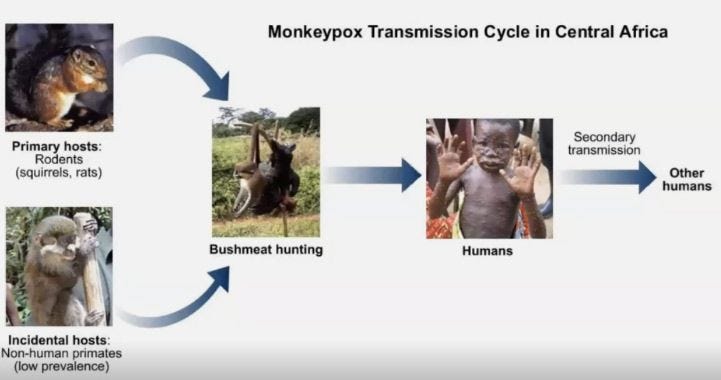Is "Mpox" Really a Global Emergency?
If we call Mpox a global emergency, what do we call malaria or tuberculosis, which kills more than one million per year?
A Global Emergency?
If you’ve been following the news, you'll know monkeypox is making headlines again. Of course, it goes by a new name now—mpox, as declared by the WHO. And as media coverage intensified, the WHO issued another declaration: mpox is a "public health emergency of international concern (PHEIC)" as of August 14, 2024:
Now, this isn’t the first time the WHO has sounded the alarm on monkeypox. They declared a mpox emergency back in June 2022 as well. But is that just more monkeying around from the WHO?
The August 21, 2024 FLCCC Weekly Webinar cut through the Mpox noise to get to the bottom of the “emergency.” Ardent WHO watchdog Dr. Kat Lindley and pathologist Dr. Ryan Cole were guest hosts. Both are FLCCC Senior Fellows, and joined together to put an end to the monkey shines and help you make informed decisions. So be sure to click play above, or keep reading for the top six highlights!
A Brief History of Monkeypox (Mpox) Outbreaks
How Does Monkeypox Transmission Work?
What are The Signs and Symptoms of The Monkeypox Virus?
Who is Most at Risk for Severe Disease with Mpox?
Are There Mpox Treatments Available?
So, What's Really Going on With Mpox?
A Brief History of Monkeypox (Mpox) Outbreaks
Let's talk about the virus formerly known as monkeypox.
Mpox is a viral disease caused by the monkeypox virus, first identified in 1958. The first human case was recorded in 1970 in the Democratic Republic of the Congo, with most cases historically confined to Central and West Africa. In 2022, a global outbreak brought mpox into the spotlight, though the number of infections remained relatively low.
While public health organizations like the Centers for Disease Control (CDC) and WHO responded with preventive measures, including vaccination campaigns, it’s important to recognize that the actual number of mpox cases has been limited. Mpox symptoms usually include fever, swollen lymph nodes, and a rash, but transmission has been relatively contained.
In the most recent outbreak, there have been 17,000 cases with 500 deaths reported. But as Dr. Cole points out, there are a few caveats:
"I would defy anyone to go to the medical literature and show me an autopsy report concluding monkeypox was the cause of death. In the last outbreak, 40% of the individuals that had clade II were HIV positive, so it will favor the immune suppressed as well."
How Does Monkeypox Transmission Work?
According to Dr. Cole, there are two ways mpox can be transmitted. The first is contact with infected animals, which can occur during bushmeat hunting.
The second way monkeypox can be transmitted is through sexual contact. This is by far the most common mode of transmission.
"The primary mode of transmission is amongst men who have sex with men and prostitutes and those family members who are in close contact with them." - Dr. Ryan Cole
Specifically, transmission occurs with contact with infected animals, skin, body fluids, towels, blankets, respiratory droplets. The virus is not floating in the air, you'd have to be in super-close contact with an infected individual to be infected.
What are The Signs and Symptoms of The Monkeypox Virus?
Here are the first signs and symptoms of the mpox virus:
Headache
Muscle aches and backache
Exhaustion
Swollen lymph nodes (a key distinguishing feature from smallpox)
Respiratory symptoms (such as sore throat or cough) may also occur
After that, a rash breaks out in 5 stages:
Macules
Papules
Vesicles
Pustules
Scabs
"Mpox is in the orthopox family of viruses. It's not as virulant obvious as smallpox was, which was obviously a huge world problem for a long time."
Who is Most at Risk for Severe Disease with Mpox?
In the webinar, Dr. Cole says the spread of clade Ib across Africa has raised concerns about its potential for further spread within the continent and beyond in high-risk populations.
Remember, the high-risk populations are primarily men who have sex with men, prostitutes, and family members or others in close contact with infected individuals.
So, if you are not in or traveling to Africa, and you are not in the high-risk population, then you have nothing to worry about. Mpox is a rare disease.
Are There Mpox Treatments Available?
While the vast majority of people survive, there is a small risk of death for mpox patients. Naturally, people may be wondering if there are treatments available.
Though not exactly a treatment, Dr. Cole issued a good reminder about the folly of vaccinating in the middle of an outbreak:
"Vaccinating in the middle of the spread of a virus is not the time to vaccinate, and it will lead to mutational pressure on the virus to evolve around that vaccine. One selects for hardier strains of a pathogen when they vaccinate in the middle of a spread, it's completely illogical."
Dr. Cole talked about a few potential treatments that exist, namely Tranilast, an anti-allergic drug primarily used to treat asthma, and a variety of natural remedies that could work for pox viruses including the Purple Pitcher Plant native to South America.
So, What's Really Going on With Mpox?
Many people find themselves wondering, what's really happening with Mpox? As our friends at The Brownstone Institute point out, the problem of Monkeypox seems infinitesimally small compared to other diseases like malaria for example:
"About 500 people have died from Mpox in DRC this year, over 80% of them under 15 years of age. In that same period, about 40,000 people in DRC, mostly children under 5 years, died from malaria."
Author David Bell also rightly points out:
If we call mpox a global emergency, what do we call malaria or tuberculosis, which kills more than one million per year?
Why would health authorities suddenly raise the alarm when there are far more pressing matters of health to address?
One theory from Dr. Robert Malone: he says the mpox uptick is a form of "psychological bioterrorism" and cautions investors to beware of what he calls "Disaster Cronyism". He suggests that we may be witnessing a scenario where fears allow naive investors to be duped into investing in things like a monkeypox vaccine for example.
"10 million doses are being ramped up and requested, which I find rather interesting when the scale of outbreak isn't concerning." - Dr. Ryan Cole
As we've seen in recent years, with "new" viruses come new opportunities to make money. During COVID, the PCR testing market shot up over 400%. If mpox was able to emulate even a fraction of that success, there could be a lot of money to be made.
Now That You Have That Monkey Off Your Back...
The final verdict from our experts: 99.99% of people have nothing to worry about with the current mpox outbreak. Moreover, the World Health Organization decision to label this outbreak a global emergency highlights the hypocrisy at play. Dr. Cole sums it up perfectly:
"How many malaria deaths are there? Six hundred thousand. And we're talking a handful of deaths, most of which are probably with monkeypox and not of monkeypox. And malnourished and immunosuppressed, as you mentioned. But it shows you how overreaching these types of policies can be in these international health regulations and treaties. Because if you can say a few hundred deaths are an international emergency, good grief. What about the six hundred thousand? You know, is there malaria International emergency?"
If you still haven't clicked play on the webinar above, there was so much more covered that you won't want to miss:
Dr. Lindley speculates that the renewed mpox funding in Africa might be linked to the failure of the WHO pandemic treaty, suggesting it could be an attempt to sway the nations that voted it down.
Dr. Cole elaborates on potential gain of function research that may have taken place with mpox.
Dr. Cole discusses the potential use of ivermectin for mpox and other viruses.
"The best cure for this current virus is turning off the mainstream media, then I think you won't get it."
To join the conversation, head to the FLCCC Forums, or follow us on X, and please consider supporting our work.










Dang it. Gonna have to give up bushmeat and prostitutes so I can dodge the M- Pox.
Stay tuned for another video on Mpox on the Whole Body Health platform on the FLCCC website. Just recorded it yesterday and in production to get posted soon.